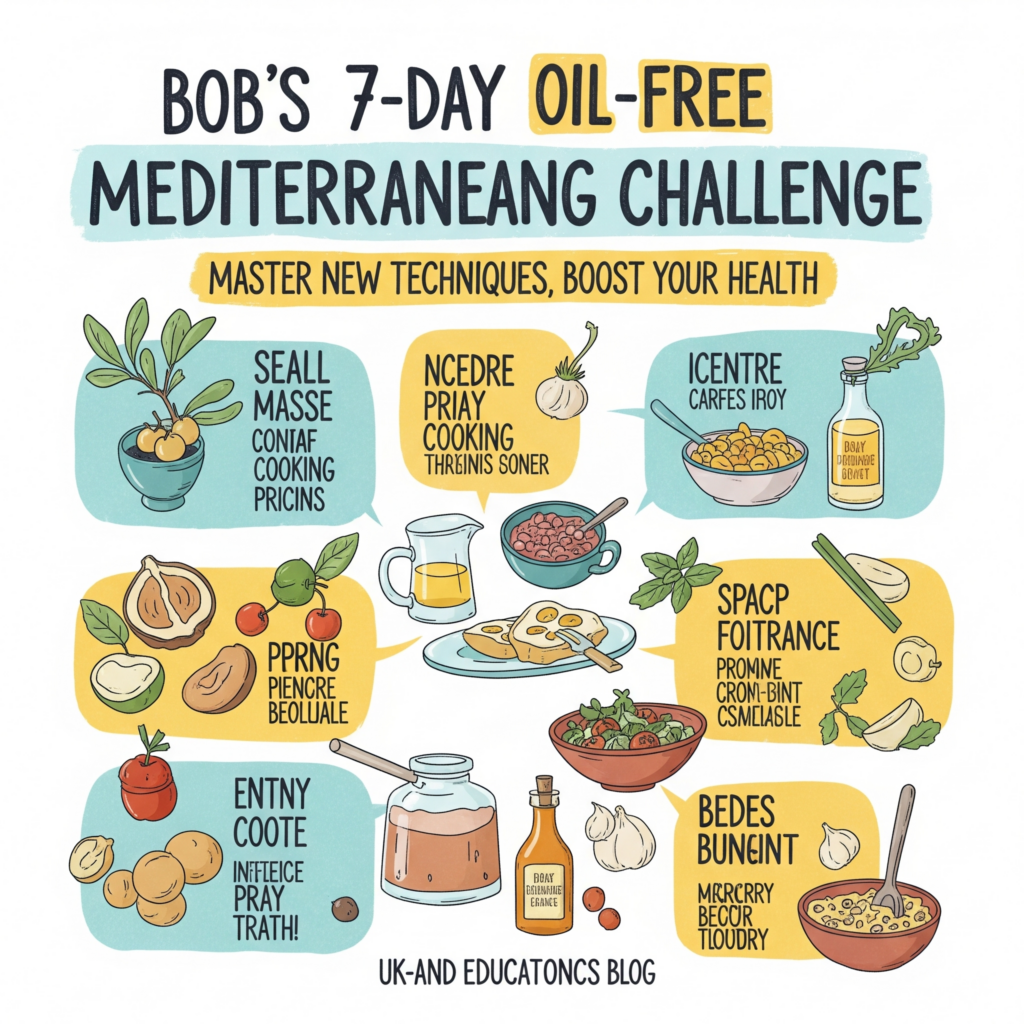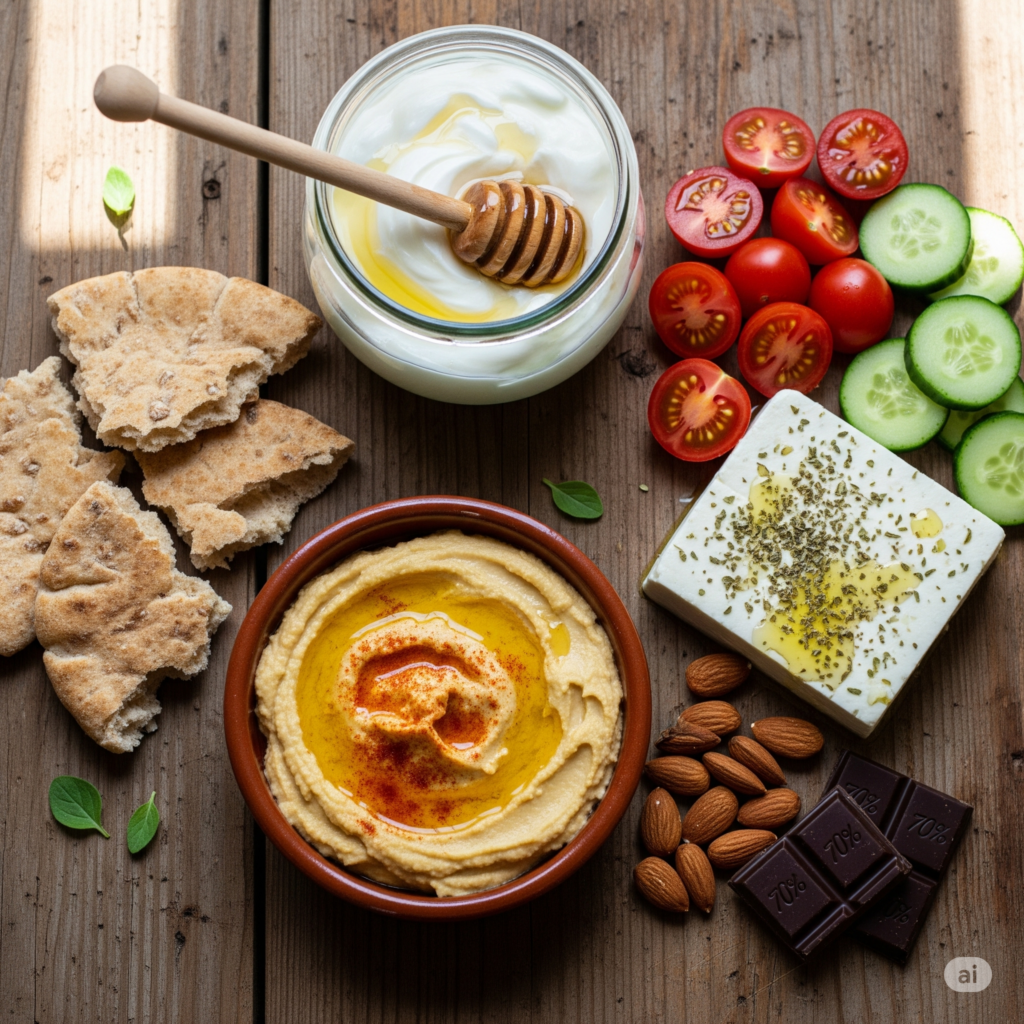Right, let’s talk snacking! That 3pm slump where you’re eyeing the biscuit tin? I’ve got you. Mediterranean diet snacking isn’t about deprivation, it’s about clever choices. I’ll share my personal supermarket cheatsheet, full of no-cook goodies from Tesco, Sainsbury’s, and beyond. It’s all about keeping you full and happy, just like I teach my students!
- Discover delicious, ready-to-eat Mediterranean snacks.
- Learn simple swaps for healthier choices.
- Master supermarket shopping for the Med diet.
- Find quick and easy snack ideas for busy days.
- Ditch the guilt and enjoy snacking the right way.
Quotables
- Over 70% of adults snack at least once a day.
- Save 20% on your weekly shop with smart snack choices.
- Reduce heart disease risk by 10% with healthy snacks.
First, What Makes a Snack ‘Mediterranean’ Anyway?
Before we hit the shops, let’s have a quick chinwag about what makes a snack truly “Mediterranean.” It’s not about strict rules, is it? More like a good MOT for your lifestyle. Think quality over calories—simple as that!
A good Mediterranean snack is like one of my best students: whole, full of healthy fats, and bursting with fibre!
- It’s a whole food: Think an apple, not apple-flavoured sweets. Real, natural ingredients are key. You know, as nature intended!
- It’s rich in healthy fats: The good fats, mind you. Like those in olives, nuts, and avocados. Proper brain food, these are—essential for keeping you sharp!
- It’s got fibre: Keeps you full and happy. Like the glue that holds everything together, eh? Find it in fruits, veg, and whole grains.
What we’re dodging are those processed snacks with ingredients that sound like a chemistry experiment. Simple, right? Right then, on to the fun bit—what to actually buy!
My Go-To, Grab-and-Go Snacks from the Supermarket Aisles
This is my tried-and-tested list – the snacks I always have on my shopping list. Zero cooking required, and easy to find in any UK supermarket. They’re my absolute staples.
- Proper Greek Yoghurt: The thick, creamy kind. Full-fat is best; Fage Total 5% or Yeo Valley Super Thick are my personal faves. Packed with protein and probiotics! If you’re curious about other dairy options on the Med diet, check out this guide.
- A Handful of Olives: A Mediterranean must-have, wouldn’t you agree? Salty, satisfying, and full of those healthy fats. Kalamata or Nocellara olives are fantastic. Give those sad, brine-soaked ones a miss—head for the deli counter or look for jars marinated in herbs and olive oil. Studies show that olives offer numerous health benefits.
- The ‘Good’ Nuts: Almonds and walnuts are your best friends. Healthy fats, protein, and fibre—what more could you ask for? A small handful is all you need.
- Fresh & Dried Fruit: Nature’s fast food! An apple, a pear, a handful of berries—all perfect. For a bit of a treat, dried figs or apricots are wonderfully indulgent. Just keep an eye on added sugar, though.
- Hummus with Veggie Sticks: A classic combo for a reason! Sabra or supermarket own-brand hummus are both good. Pair with pre-chopped carrot or cucumber sticks—lovely crunch. Satisfying, too.
- Tinned Fish in Olive Oil: Honestly, if you haven’t tried this, you’re missing out! A tin of mackerel or sardines is a proper Omega-3 powerhouse! Explore your pantry options further with this guide on tinned beans.
- Tzatziki Dip: Think of it as yoghurt’s cooler cousin! Made with yoghurt, cucumber, and garlic. Perfect with veggie sticks or whole-grain crackers.
- Feta Cheese Cubes: Savoury, protein-rich, and absolutely delicious. Pair with cherry tomatoes for a flavour explosion. Find more delicious cheese options in this helpful UK guide.
- Roasted Chickpeas: Missing crisps? These are your answer. Brands like Brave do great ready-made ones, or—if you’re feeling ambitious—you can easily roast them yourself. Crispy, savoury, and full of fibre. Clever, right?
- Lupin Beans: My secret weapon! High in protein and fibre, you can find them in jars (often lurking in the world food aisle). Rinse and enjoy! They’ve got a satisfying bite. Learn more about the nutritional profile of lupin beans here.
- Whole-grain Crackers with Avocado: Nairn’s Oatcakes are my go-to. Top with mashed avocado, salt, and pepper—quick, filling, job done.
- A Couple of Squares of Dark Chocolate: Yes, chocolate is allowed! Choose good quality dark chocolate (70% cocoa or higher). It’s lower in sugar and full of antioxidants. Just a square or two to satisfy that sweet craving. Mayo Clinic offers some insights into the potential health benefits of dark chocolate.
Golden Rule: Read the Label!
Quick story. When I first started with this whole Med diet lark, I grabbed some “yoghurt-coated” almonds, thinking, “Oh, how healthy!” Turns out, they were mostly sugar and vegetable oil! Bit of a faff, that was. Learned that one the hard way.
So, here’s the golden rule: always check the ingredients list. Don’t be fooled by the fancy packaging! Look out for these two sneaky blighters:
- Added Sugar: It goes by many names (glucose, fructose syrup, you name it). If it’s high up on the list, put it back! Simple.
- Types of Oil: Olive oil is our friend. Many snacks use sunflower or palm oil, which, frankly, we’re trying to swerve. Learn more about making healthy fat swaps in this helpful guide.
Trust me, taking two minutes to read the label will save you from a world of unhealthy choices. You’ll be a supermarket Sherlock in no time!
Methods & Evidence — An Observation Plan
Here’s a simple 7-day plan I use with my students; it helps them (and me!) master oil-free Mediterranean cooking. Each day focuses on a different technique, building confidence bit by bit.
- Day 1 (Monday): Practice water sautéing with onions and garlic. Aim for 10-15 minutes cooking time.
- Day 2 (Tuesday): Try roasting vegetables at 200°C for 25-35 minutes until golden.
- Day 3 (Wednesday): Steam green vegetables for 4-6 minutes, then finish with a squeeze of lemon.
- Day 4 (Thursday): Use your air fryer at 180°C for 12-18 minutes for crispy results.
- Day 5 (Friday): Braise lentils or beans for 30-45 minutes until tender.
- Day 6 (Saturday): Grill vegetables on high heat for 3-5 minutes per side.
- Day 7 (Sunday): Combine techniques for a complete oil-free Mediterranean feast.
Illustrative Teaching Table
| Technique | Temperature Range | Typical Time | Best Foods | Flavour Tip |
|---|---|---|---|---|
| Water Sauté | Medium heat | 10-15 mins | Onions, garlic | Add splash of wine |
| Roasting | 200-220°C | 25-35 mins | Root veg, peppers | Balsamic finish |
| Steaming | 100°C | 4-8 mins | Greens, broccoli | Lemon & herbs |
| Air Frying | 180-200°C | 12-18 mins | Potatoes, tofu | Spritz with citrus |
| Braising | 160-180°C | 30-60 mins | Beans, lentils | Fresh herbs at end |
| Grilling | High heat | 3-5 mins/side | Aubergine, mushrooms | Marinate first |
| Non-stick | Medium-low | 5-10 mins | Eggs, fish | Build aromatics |

Sources
- British Heart Foundation – Mediterranean Diet Guidelines
- NHS Live Well – Healthy Eating Recommendations
- GOV.UK Food Standards Agency – Cooking Methods
Note: The cooking times and temperatures provided are educational examples only. Always adjust based on your specific equipment and ingredients.
Frequently Asked Questions (The Quick-Fire Round!)
Can I have crisps on the Mediterranean diet?
I wouldn’t recommend it, love. Most crisps are fried in unhealthy oils and, well, they’re not exactly bursting with nutrients. If you’re looking to lower cholesterol, here are some helpful swaps. Roasted chickpeas are a much better crunchy alternative.
Is popcorn a good Mediterranean snack?
Absolutely, as long as it’s air-popped and you season it yourself. Steer clear of those buttery microwave bags! Being a whole grain, it’s a good choice.
What about shop-bought cereal bars?
Be very careful with those! Most are absolutely crammed with sugar. A Nakd bar (just fruit and nuts) is okay, but—and I can’t stress this enough—always check the ingredients.
What if I’m craving something sweet?
I hear you! A couple of squares of dark chocolate (70% cocoa or higher) can really hit the spot. Lower in sugar and packed with antioxidants. Or try some dried fruit – figs and apricots are like nature’s candy, aren’t they?
Where can I find more quick Mediterranean meal ideas?
Don’t you worry, I’ve got you covered! This article on 15-minute skillet meals is a lifesaver for those busy weeknights. Honestly, a game-changer.
Snacking Success is Yours!
See? Mediterranean diet snacking is easy peasy and delicious. For a complete shopping list to get you started, check out this article. It’s all about making smart swaps. Olives instead of crisps, dark chocolate instead of biscuits—small changes, big difference!
Happy snacking!
